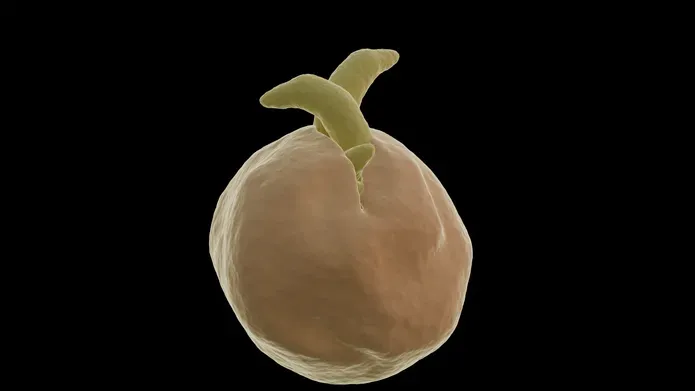Feature
Cryptosporidium: fighting a deadly parasite
Researcher Dr Mattie Pawlowic leads research into drug-resistant Cryptosporidium to protect our health and agriculture
Published on 16 July 2025


An artist's rendering of Cryptosporidium parasites (yellow) hatching out of their shell (orange). Credit Harry Duncan
As our knowledge of science has evolved, humanity’s ability to regulate our environment has grown considerably. The ability and the degree to which we can control the temperature of our homes, the quality of air we breathe, and the cleanliness of our surroundings are huge advances compared to generations before us. But what happens when we encounter something that we cannot control?
What is Cryptosporidium?
Cryptosporidium is a parasite that cannot be killed by household cleaning products. A waterborne organism that can easily spread, it is resistant to typical water treatment methods, while UV treatment, filtration, or boiling water on a large scale are either expensive or impractical.
After infecting a person, Cryptosporidium can cause chronic diarrhoea that can prove fatal, with children, older people, or those who are immunocompromised particularly at risk.
Taking on this formidable opponent is Dr Mattie Christine Pawlowic, a Principal Investigator and Sir Henry Dale Fellow at the University’s School of Life Sciences, who is leading the way in efforts to reveal Cryptosporidium’s secrets.
“Bleach simply will not work, so boiling or UV light is the only way to treat it and those are expensive options. You also need to kill every single parasite because it is so highly infectious. Getting rid of it is a huge challenge.”
Dr Pawlowic is a rising star of UK science, having collected the Biochemical Society’s Early Career Research Award and Royal Society of Edinburgh’s Dame Anne McLaren Medal in Life Sciences. She has been studying Cryptosporidium since 2013, developing tools that allow scientists to investigate the fundamental biology of the parasite.
Though most devastating in areas with poor sanitation, outbreaks can also occur in developed countries when there is an issue with water treatment, or in recreational waters. Presently, the only available treatment - Nitazoxanide - is not effective in young and malnourished children, and in immunocompromised adults, highlighting the urgent need to improve our understanding of the parasite.
As well as humans, Cryptosporidium also plagues the farming sector, infecting livestock, resulting in a huge cost to the UK economy.
In a significant breakthrough last year, Dr Pawlowic and her team, in collaboration with the University’s Drug Discovery Unit and researchers at the University of Vermont, identified two drug molecules that demonstrated positive results in controlling cryptosporidiosis in calves, but with further research required, the sector remains hugely vulnerable. Her current work, funded by a Career Development Award from Wellcome, focuses on how Cryptosporidium remains so resilient.
“In the UK we are reasonably sheltered from outbreaks, but as we have seen when they do happen, like the outbreak in Devon in 2024, or smaller scale ones during lambing season, the ramifications for people are significant and it becomes headline news,” she added.
Dr Mattie Pawlowic
Meet the researcher
With a bachelor's degree in Cell and Molecular Biology, and a PhD in Biology from Texas Tech University, Mattie's journey to fighting the parasite cryptosporidium brought her to Scotland to set up her lab in the Wellcome Trust Centre for Anti-Infectives Research (WCAIR).
person

The drug molecules that demonstrated positive results in controlling cryptosporidiosis in calves offer a glimpse into the incredible potential of our research. But imagine the breakthroughs yet to come, the diseases that could be cured, and the challenges that could be overcome with continued support.
Donate today and help Dr Pawlowic and other researchers combat challenges such as Cryptosporidium.